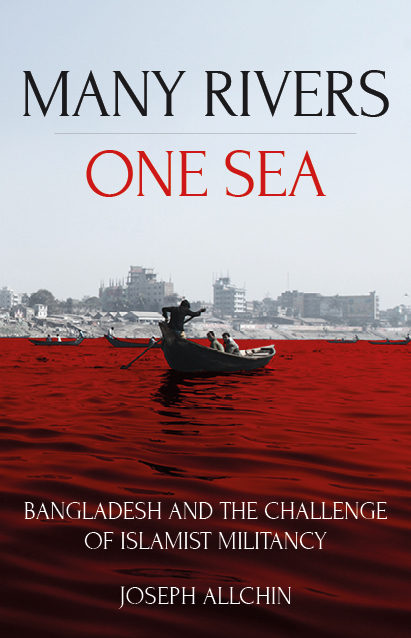
May 2019 • £17.99 $19.28 on Amazon
9781849048743 • 240pp
Review by Arnold Zeitlin 19 January 2020
Writing as Joseph Allchin, the author lays out in vivid, if not bloody, detail, the persistence in contemporary Bangladesh of violent extremism in the name of Islam. He has produced one of the best compilations of terror in Bangladesh in English and between two covers. Allchin, who has reported widely about events in South Asia, wisely tends to avoid claiming that such violence suddenly is on the rise in Bangladesh, pointing out in his narrative that extremism in the name of Islam goes back at least to the 18th century in Bengal. Sheik Mujibur Rahman, in the climactic month of March 1971 spent considerable energy trying to suppress the violent tendencies of his youthful followers, although their goals were more nationalistic than religious. Of course, Mujib and almost his entire family were wiped out in what amounted to a terrorist act in 1975.
“Foreign-inspired Salafi or Wahhabi political agitation is far from new in the region,” writes Allchin, citing the examples of Haji Shariatullah, born in the late 18th century, who studied in Mecca and Cairo before returning to his native Bengal in 1820 to spark the Faraizi movement, “a symbiosis of revivalist Islam and agrarian revolt”, and Titu Mir, who returned about the same time from Mecca to what now is West Bengal inspired by the Saudi religious leader Muhammed ibn Abdul Wahhabi, Titu’s “rebellion was loud and violent,” writes Allchin.
In seeking to determine the push behind the extremism, Allchin notes the role of Bangladesh’s political leaders. He concludes:
“In recent years, the guardians of the Bangladeshi state have accommodated more demands from radical groups as they seek to maintain their own power. If this goes on, politics in Bangladesh will undoubtedly continue to be shaped by the movements, people and ideas discussed in this book.”
He goes on to write:
“Bangladesh’s government has ceded much ground to Islamists, largely because of political expediency. The use of religious rhetoric in 2013 was undoubtedly a political tactic by Jamaat to try to shield their convicted leaders from the judicial process of the International Crimes Tribunal. The BNP followed suit. Within the political context of Bangladesh, this was a winning formula that was calculated to be incendiary, and to stigmatize so as to shut down debate. The Awami League was forced to kowtow to majoritarian forces of conservatism and, some would say, bigotry, in order to maintain stability and, most importantly, power.”
Of course, the United States played a role, too, in Allchin’s view, mentioning two of the most radical organization in Bangladesh: “The United States has in Bangladesh’s short history supported dictators who have actively utilized and fostered the extremist culture that has now so bedeviled the American twenty-first century. Similarly, it was in a period of democracy under Khaleda Zia of the BNP that returnees from an American-sponsored war in Afghanistan formed organizations like JMB (Jamaat-ul-Mujahideen) and Harkat-ul-Jihad al-Islami Bangladesh, which inspired today’s generation of Islamist radicals.
Not that Allchin isn’t hard on the Awami League.
“The Awami League government’s autocratic lurches have been persistent and have worsened since the attack,” he writes, referring to the bloody assault on Dhaka’s Holey Artisan bakery in 2016. “…Dissent has been stamped out further; members of the opposition and participants in informal protests have been treated abysmally. The most egregious state actions have included forced disappearances and the blanket suppression of freedom of speech.”
He suggests the United States and other Western countries have hesitated giving Bangladesh weapons, such as surveillance equipment, to fight extremism because they feared they would be used against political rivals. Modern Bangladesh itself, beyond political parties, comes in for blame for a climate that “in many ways provides textbook breeding grounds for ‘resentment’. It is a young political entity….many of the terms of its constitution are not upheld. Promises of equality and justice go unmet, while corruption and inequality flourish.”
The killings at the Holey Artisan bakery, which Allchin covered as a reporter, are dissected in detail in more than two chapters; he notes the idea of the book was conceived in the aftermath of the massacre.
Allchin covered many of the terrorist incidents, the attacks on secular bloggers, the killings of foreigners, the Bangla Bhai episode and the activities of organizations like the Hefazat-e-Islam and the Harkut-ul-Jihad al-Islami. He reached out to meet characters involved in the extremist movements, giving his tale an authoritative edge.

Will written, heads up! thanks